When John Allen Chau, a twenty-six year old Chinese American Christian from the United States, ventured into the Indian Ocean in a vain attempt to evangelize an indigenous tribe well-known for their hostility to outsiders, little did anyone know the full impact of his efforts. The conversation sparked by his death at the hands of the Sentineli tribe has riveted leaders all over the church and blog regular Francisco Herrera is adding his voice to this discussion. But instead of discussing the motives and morality of the slain missionary he instead focuses on what the progressive Christian church can learn from this sad affair.
Read, comment, and share.
Rev. Dr. Linda E. Thomas – Professor of Theology and Anthropology, Chair of LSTC’s Diversity Committee, Editor – “We Talk. We Listen.”
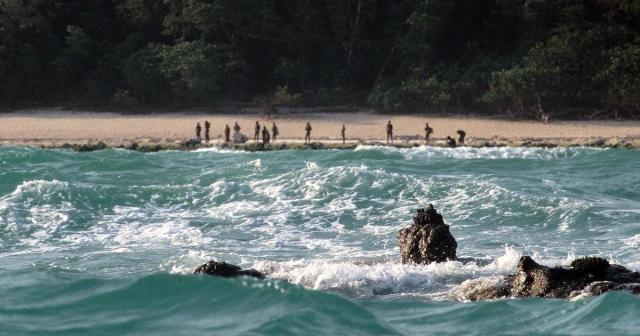
A photograph of members of the Santeneli tribe, guarding their shoreline against landing by the boat from which this picture was taken.
When I heard that a young missionary from the United States, John Allen Chau, had been killed while trying to evangelize a hostile indigenous community on a remote island in the Indian Ocean, it didn’t take me too long to guess the tribe. I easily recalled the old National Geographic footage from the documentary “Man in Search of Man” (begins at 16:30 in the link) that I’d seen three years before, showing an aborted attempt to contact the community living on North Sentinel Island, the film’s director getting a five-foot long arrow in the leg from his troubles – and this despite being in a boat nearly a quarter of a mile from the island’s shore when shot.
I cringed to think of this ill-advised, misguided young man suffering a similar fate – though likely shot through by more than just one arrow – the fishermen who returned to the island to check on him the next day saying how they saw his body being dragged along the beach and buried.
Initial responses to Chau’s killing quickly split into two camps – those speaking of him as a martyr for the faith, and those seeing him as a clueless tool of colonialism whose fool-hardiness earned him death. Facts on the ground tended to confirm the latter, as excerpts of his final letter to his parents revealed what before had only been speculation. Those last days Chau made multiple attempts to communicate with the Sentineli, not just one as many had assumed, by shuttling back and forth between North Sentinel’s shore and a boat crew he’d hired to take him to the forbidden island, but his ignorance (or arrogance, depending on whom you ask) pitifully hampered his efforts.
He tried introducing himself in English, which they didn’t speak, singing Christian songs which they didn’t know, and making gifts to them of things that they didn’t need. He’d even been let off with a warning for his intrusion, so-to-speak, as when shot at by one of the Sentineli children, the arrow struck Chau’s water-proof Bible in his outstretched hand, not his body. He later wrote that these rejected attempts at communication left him feeling frustrated, leading him to pout “is it worth me going a foot to meet them?” But between his zeal and his thought that the island might be “Satan’s last stronghold” Chau went back one last time, telling the boat crew to return home with the assurance that he would be safe to stay on the island overnight.
He was killed sometime afterwards.
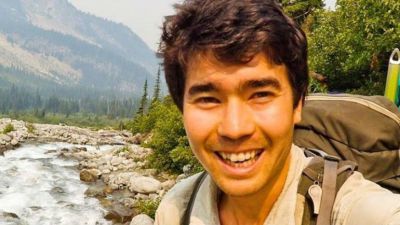
John Allen Chau in 2017
Over the Thanksgiving weekend countless bloggers and commentators have weighed in with their respective takes on the subject, however their nuance still follows the same binary that emerged during those first hours after Chau’s death was announced: that he was either a martyr or a fool. I’ll admit to being in the latter category, because it is unconscionable to me he would go and preach Christ to a new people utterly indifferent to their culture, not to mention so filled with entitlement as to suggest that he should be listened to. Added to this, was the fact that Chau paid no heed to the dire warnings he surely received that outside human contact with the Sentineli might decimate the island’s population, as they are so isolated that they have likely not developed any immunity to modern illnesses.
But my concerns in this post have little to do with judging a dead man, rather, I hope to initiate a deeper conversation around what I see to be another example of the progressive Church in the United States being very selective (I would even say cowardly) in where and how they make counterclaims in response to intolerant Christian communities and their often destructive theology and praxis.
And Mr. Chau’s story highlights what I believe to be multiple such concerns.
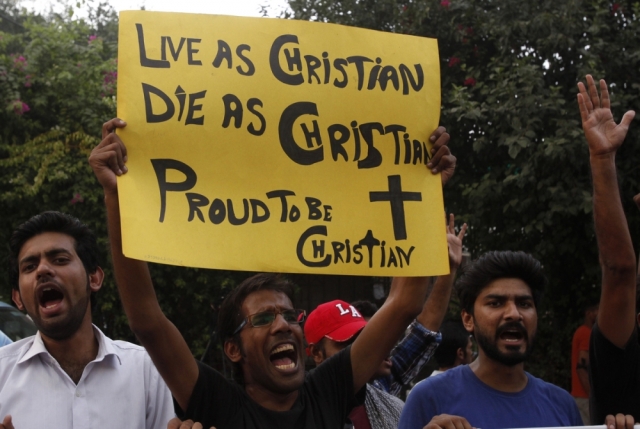
Pakistani Christians protesting against government harassment and public killings
On one level, it puts in stark relief how the cause Christian martyrdom – what it means to be a martyr as well as paying prayerful and material attention to persecuted Christians around the globe – is barely ever taken up in Progressive Christian circles – a fact which is financially exploited by multiple fundamentalist Christian organizations based in the United States.
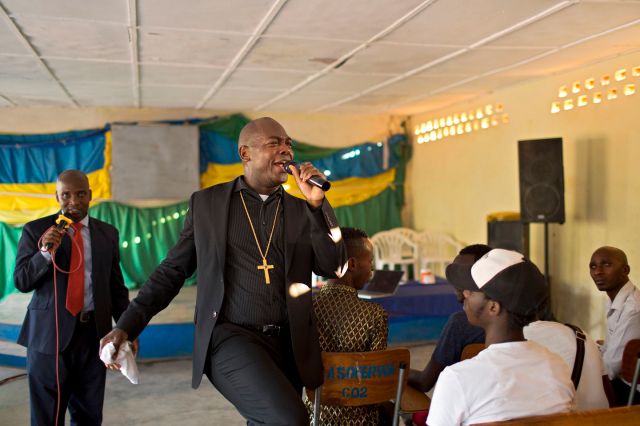
A worship service to show solidarity between the Christian church and the LGBTQ community in Kigali, Rwanda.
It also exposes the paucity of our efforts to develop genuine relationship with our beloved kindred in Christ in the Global South– to the point that whenever progressive Christians in the United States raise needed scrutiny on the violence done towards the LGBTQ community abroad, our lack of relationship to these Christian communities makes it easy for fundamentalists in the United States to paint us as judgmental, out-of-touch, and condescending – even neo-colonial.
But it is the evangelist in me that grieves the most deeply as I write, especially as one who came to Christ not in the United States, but through the global Church via an amazing community in Switzerland, the Evangelical Lutheran Church of Geneva. Situated in an unassuming building in the middle of Geneva’s Old Town, this globally-rooted congregation with about 230 active members from 47 nationalities speaking 39 different languages gave me a thorough schooling in what it meant to be a Christian connected to other Christians all over the planet.
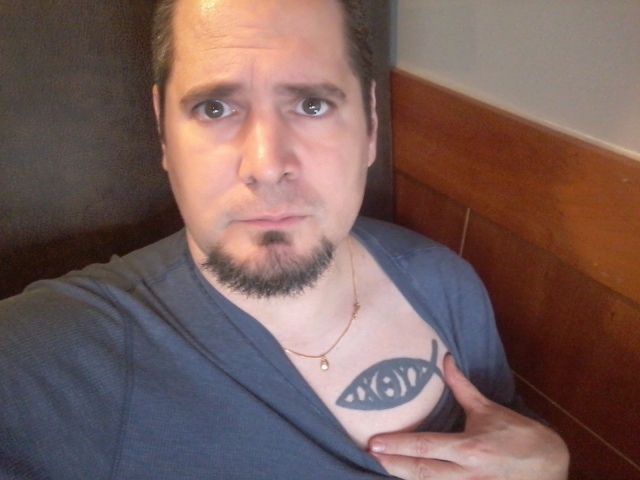
Francisco Herrera
It was among them that I first experienced the shock of the Holy Spirit and began my first efforts at evangelism – fueled by a near compulsive desire to share the beauty of this community with everyone around me. I even had a Jesus fish tattoo’d on the left side of my chest (see above) both as a visible sign of my dedication to Christ as well as a not-so-subtle conversation starter (like when I would deliberately wear thin t-shirts to make my Jesus fish more visible), making it easy to share testimony and church invites to the largely secular citizens around me.
So what does this have to do with John Allen Chau?
Over time, my experience testifying to the power of the Gospel has led me to act as a vehicle of repentance and healing for many who have been terribly abused by pastor and parish. But even more frequently, many with whom I speak express surprise and relief to know that there are indeed churches that will accept them, even love them. They often confide to me how most people who usually share Jesus with them invariably insist that something or other about them is wrong, things that they consider to be vital to who they are as human beings, let alone as a children of God.
And it saddens me that in the progressive Christian community, I have known of only three or four others with a similar love of evangelism – who love sharing the story of how God loves them so much that they invite others into their communities to share that love.

And I worry, as liberal/progressive Christians sidestep Matthew 28’s call to make disciples, that who-knows-how-many people in the United States seeking spiritual nourishment continue to live hungry – languishing in their search for community simply because many progressive church leaders don’t go out into the street and invite others into the love they’ve been given.
But on a deeper, planetary level, I see the need for progressive Christians to become more dedicated evangelists as a justice issue – for each person from more inclusive churches who invites someone to Sunday worship, there are literally thousands of others inviting people to church so that they will hear sermons teaching that if you are poor or homeless it is a sign that you have been rejected by God.
Hence those of us who are Christian leaders, prophets, and teachers of what we like to call of as ‘inclusive Christian communities’ need to do more to tell the world about the churches we serve, the love we experience, and the justice which the Holy Spirit has energized us to fight for if we are to ever counter the destructive, anti-Christ theology coming from intolerant Christian communities. We cannot be a light to the world and hide ourselves under a bowl (Matthew 5:15).
And yes, mission and evangelism has often been the first beachhead in every all-out assault by white supremacy and hegemony upon both individuals and entire societies. Yes, it is important for contemporary Christians to fully embrace and repent of the people who have died because of this complicity. But the problem is that the forces of hegemonic white Christianity are not even close to done with their work and are ever looking for new lands to ‘conquer for Christ’- just as Chau was. Therefore to counter this – as flawed as we are – all of us who claim ourselves to be proclaimers of the radical grace of God must do more to proclaim the love and acceptance of this radical God, and do so more vehemently, more unabashedly.
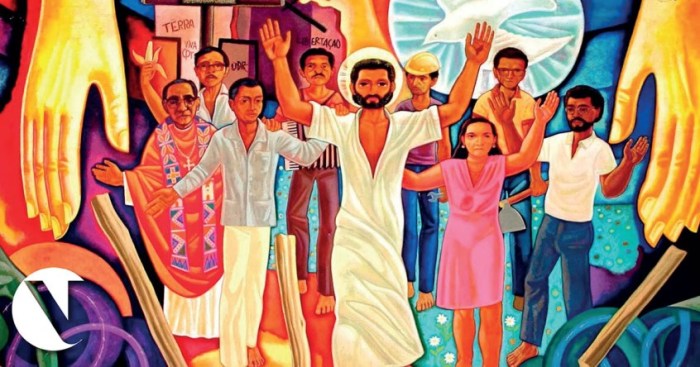
And the more of us who do this, the more of us who there are to prevent another travesty as happened on Sentinel Island from happening again.
And besides, this love that we feel, the sacrifice the Christ has made for us, this power which God has given to us to strengthen ourselves so that we might strengthen others – don’t you all think we should share it?
Aren’t you tired of reading or hearing story after story of how our faith is used to spread misery instead of boundless Grace?
Before coming to Chicago Francisco Herrera studied classical music (viola and orchestra conducting) in his hometown of Kansas City, Missouri and then Geneva, Switzerland. After feeling the call to ministry at his home church in Geneva, The Evangelical Lutheran Church of Geneva, he returned to the US to enter seminary in 2005, completing his M.Div. from Chicago Theological Seminary in 2012. Since beginning his Ph.D studies at the Lutheran School of Theology at Chicago (LSTC) in Fall of 2013, he has also been developing his skills as a seminary instructor, both at LSTC and the Lutheran Seminary Program in the Southwest. And when he isn’t doing any of those things, polymath and scatterbrain that he is, Francisco likes to write worship and devotional music, blogs at www.loveasrevolution.blogspot.com, tweets at @PolyglotEvangel, and travels the country as one of the central leaders of #decolonizeLutheranism.


Facebook Comments